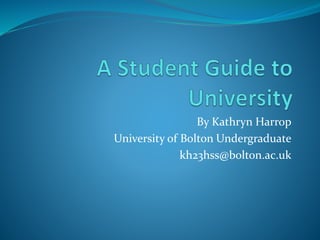
A Student Guide to University
- 1. By Kathryn Harrop University of Bolton Undergraduate kh23hss@bolton.ac.uk
- 3. What can I expect? You can expect to get a high quality education that will prepare you for later life. You can take the time to develop skills in an environment that offers help. You can also expect to meet people from all over the world and make friends, learning about their cultures.
- 4. What is campus like? There are many different aspects to being on campus. Facilities include libraries and computer rooms, labs for carrying out studies and lecture theatres. Also includes social spaces (both indoor and outdoor) for taking a break.
- 5. Accommodation and Finance Information on both of these will available on campus throughout the academic year. It would be a good idea to start saving up as soon as possible: will need money for graduation as you may have to leave home for job opportunities. You will be given advice on managing money and time during your degree.
- 6. Accommodation and Finance Living in student accommodation will obviously be more expensive than living at home. Staying at home could be better in a lot of cases. Advice on managing money is available. Student loans broken down into instalments – can help with budgeting. Keep a log of all money going in and out of your bank.
- 7. Any questions so far?
- 8. WIDER DEGREE
- 9. What kind of assessments can I expect? For the second and third years, the assessments increase in requirements. Mixture of coursework and exams; about half a semester each except in some cases. Third-year Practicum module and dissertation, run across both semesters. 1st and 2nd year modules useful – give good practice for later modules. All modules can help you to decide your future career.
- 10. Planning ahead You should start thinking about your topic for the dissertation as soon as possible. You can link it to your intended career. Numerous forms must be completed and signed off within first few months of module. Includes ethics forms (MUST be signed off before data can be collected – will be rejected otherwise).
- 11. Dissertation Have to keep logs throughout module of meetings with supervisor. Should think about it as soon as possible – ideally during the summer before. Small scale dissertation in 2nd year for practice. Initial report due a few months into module. 1500 words Finale Report due in April – between 6000 and 10,000 words. Methods modules in 1st and 2nd years useful for practice. Can be qualitative or quantitative. Use SPSS to analyse data.
- 12. Any questions?
- 13. CAREERS
- 14. Career Management and Practicum modules Career Management Writing CVs, updating existing CVs. Completing action plans to see where you are in your goals and where you want to be. Seeing what you need to do to get there. Evaluating your skills and where you can improve. Practicum Finding a work placement. Updating action plans and skills audits based on experience with modules – should hold onto documents from CM module. Gaining work experience and improving your skills – increases employability.
- 15. Documents from Career Management module Hold onto action plans and skill audits, as you will be required to hand in updated copies for the Practicum module Paperwork needs to be handed in before you can start a placement. Keep them somewhere safe, such as webmail. Saves time for finding a placement.
- 16. Careers Service Located on campus. Offers a variety of help and advice. CVs, finding jobs, volunteer work. Can help with finding you a work placement. Especially useful in 3rd year when planning for a career.
- 17. Practicum module: work experience Available in the Psychology module; if going onto different pathways you would have to check. Similar to CM module as described before. What makes one person more employable than another? After handing in paperwork, you have to find a placement and complete 60-70 hours work experience in an appropriate setting. Signed off by supervisor every four weeks or so. At the end of module, you have to write a review of what you have learned.
- 18. Time management During 3rd year and with the Practicum module, there would be many demands on your time. Normal studies (lectures, seminars, essays, exams etc.) Practicum (in placement and feedback). Dissertation Part-time work may not be possible due to this – even more useful to budget money. Help may be offered to this with children (childcare etc.)
- 19. My own experience Breaking down study into small, manageable pieces so that deadlines can be met. Didn’t do CM in 1st year, would have been helpful when starting Practicum module, especially with the documents.
- 20. Thank you for listening!
